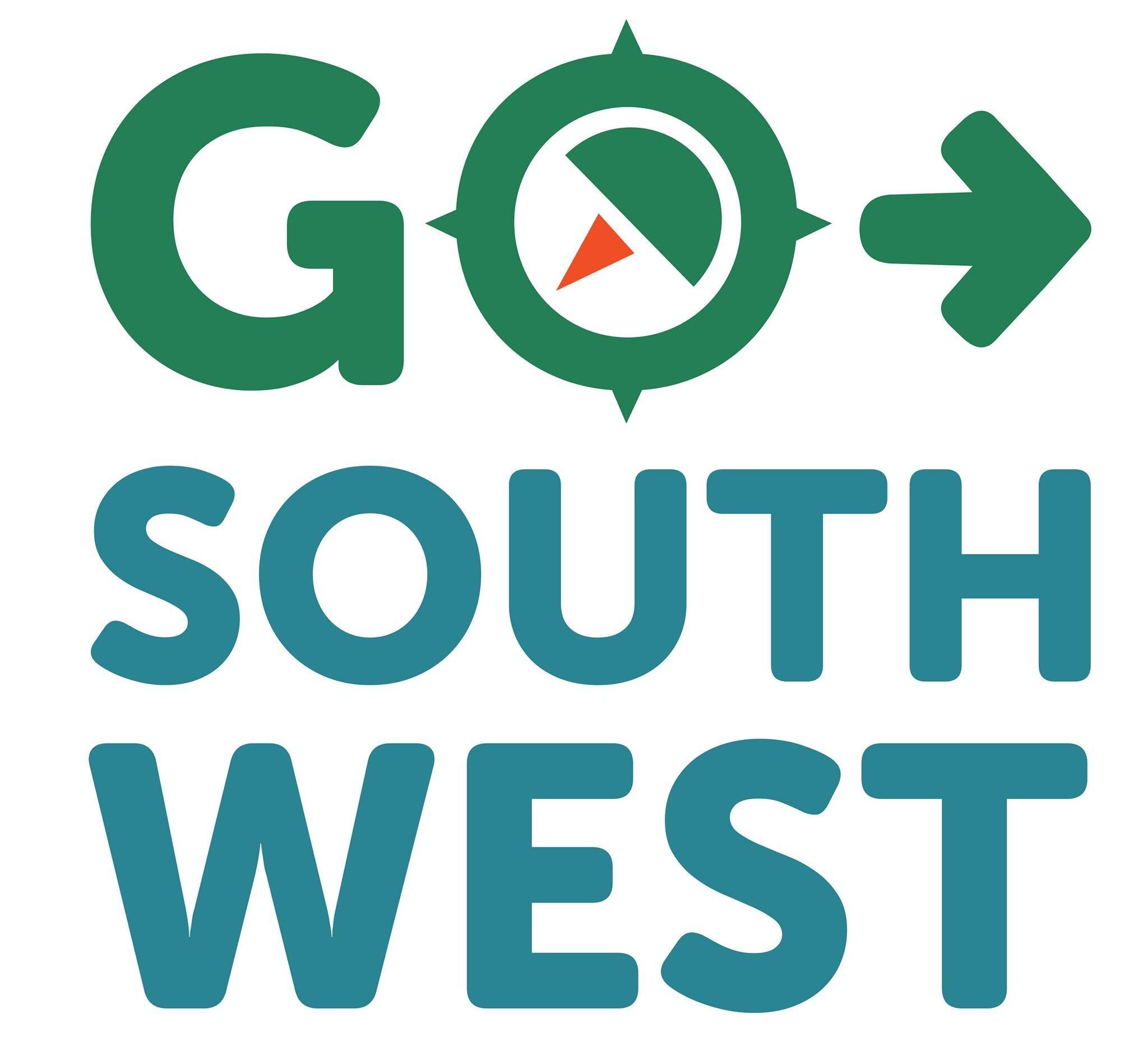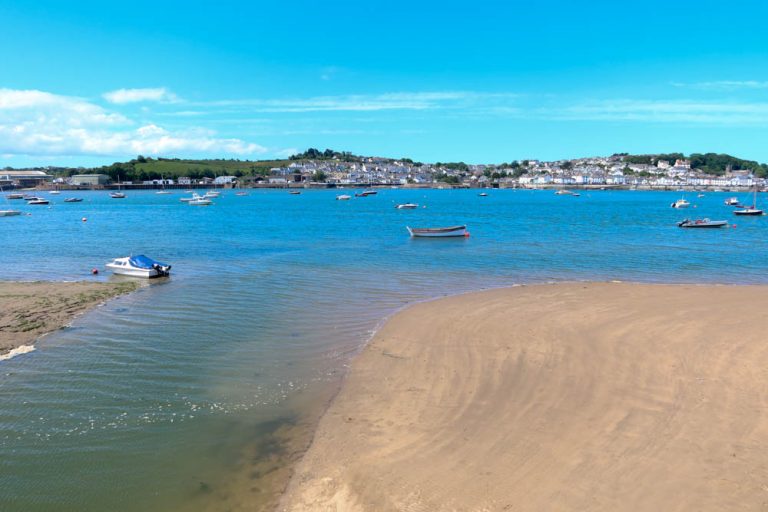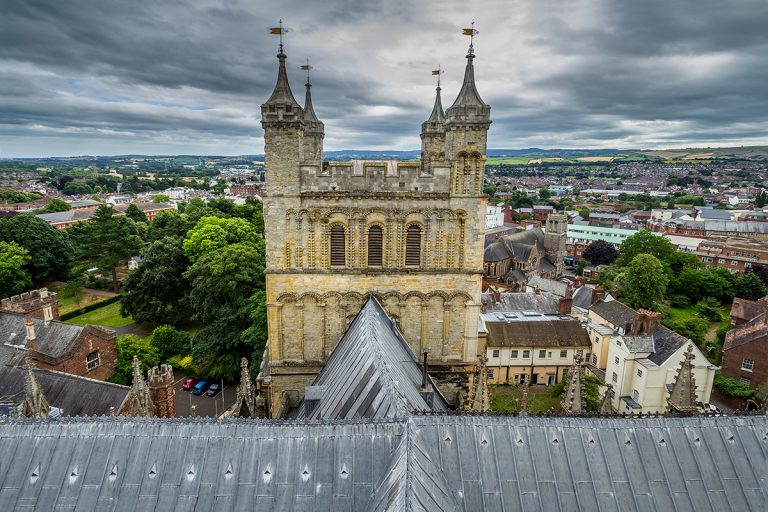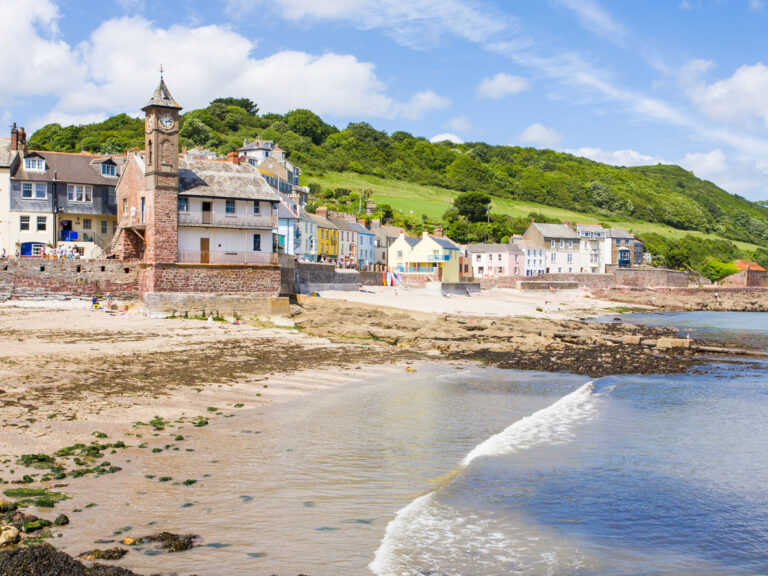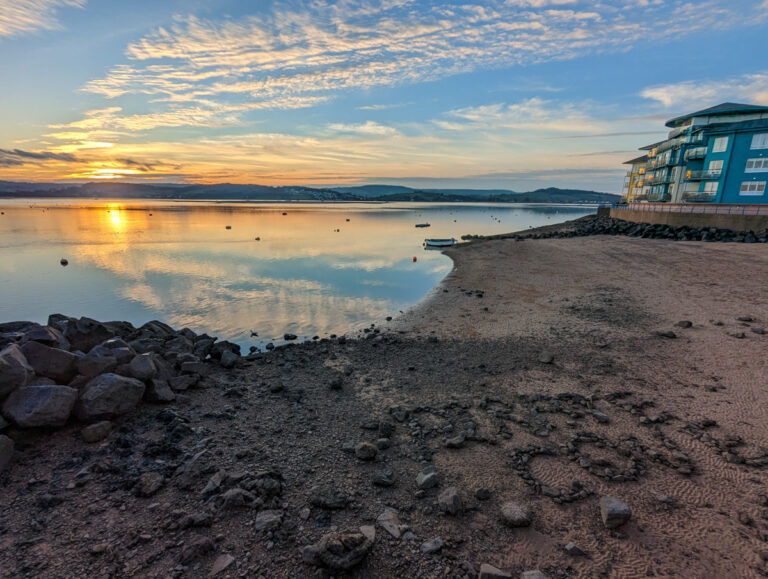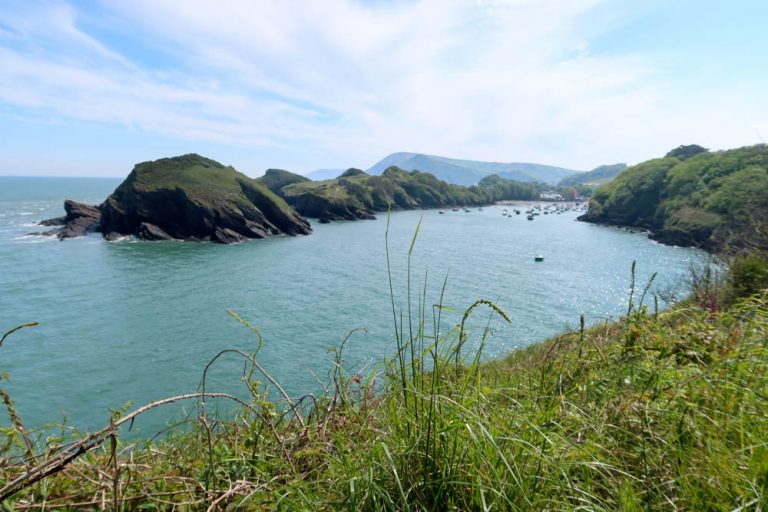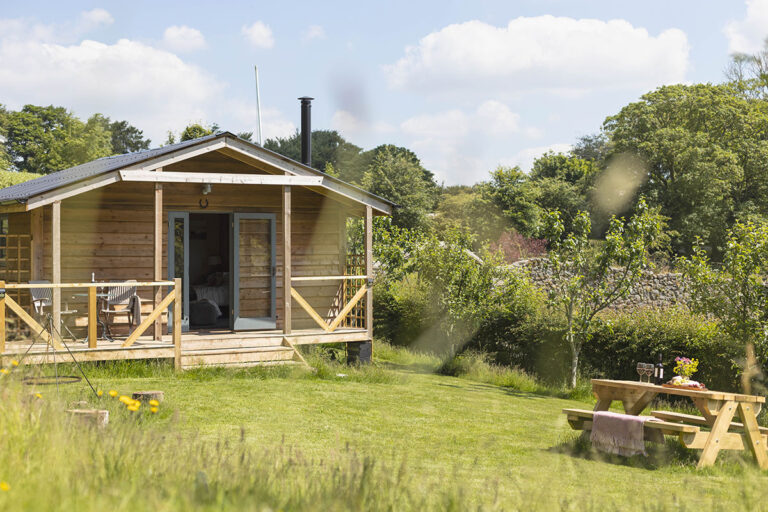Surfing in Devon: best breaks, where to stay and top local tips
Keen to find out more about surfing in Devon? You’re in the right place!
Towering waves lap the white sand beaches of North Devon, making it one of the most a popular surfing destinations in the UK.
Year-round, the waves of the Atlantic attract surfers of all levels.
Unlike Cornwall, Devon doesn’t have countless surfable beaches, but it still offers a range of breaks and towns that are focused on the sport.
Whether you’re a beginner looking to take your first lesson or an experienced surfer seeking challenging waves, Devon has something to offer!
While North Devon spots like Woolacombe and Saunton are famous within the surf communities, South Devon has a few calmer breaks that are perfect for beginners and improvers.
In this article, we’ll look at the best places to go surfing in Devon, with spots in the north and south, for all levels.
There’s also information about when to surf, what surf school to choose and surfboard rental.
Let’s get stuck in!
Is surfing in Devon good?
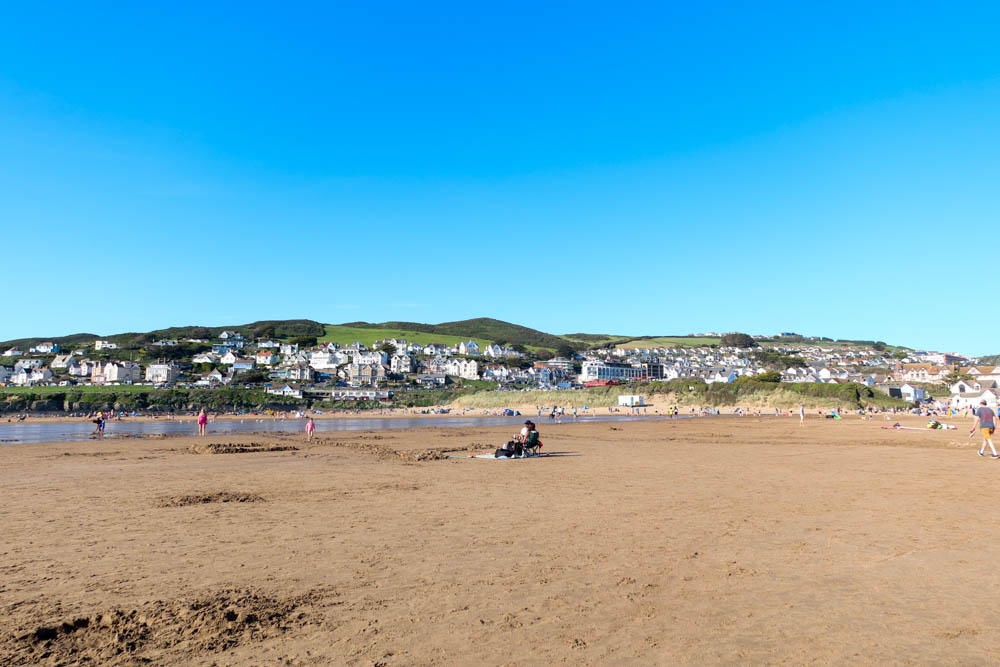
Devon is a good surfing destination – in fact, its northern coastline is a world-class surf zone.
But you have to know where to look, as parts of the county are too sheltered for beaches with waves of any surfable size.
With over 300 miles of coastline, Devon has ample coastal spots; but the popular beaches in the south of the county face the English Channel, which means that there often isn’t enough swell here for surfing.
However, north coast of Devon is known for its consistent waves, especially spots like Croyde and Woolacombe Beach.
These beaches are located on the Atlantic Ocean – the beaches further east (like those around Ilfracombe) are more sheltered as they face the Bristol Channel, and further west you have the surf beaches of Cornwall.
That being said, the south coast of Devon does have some sheltered spots with smaller waves; so it can be a good place to learn.
Surfing culture in Devon
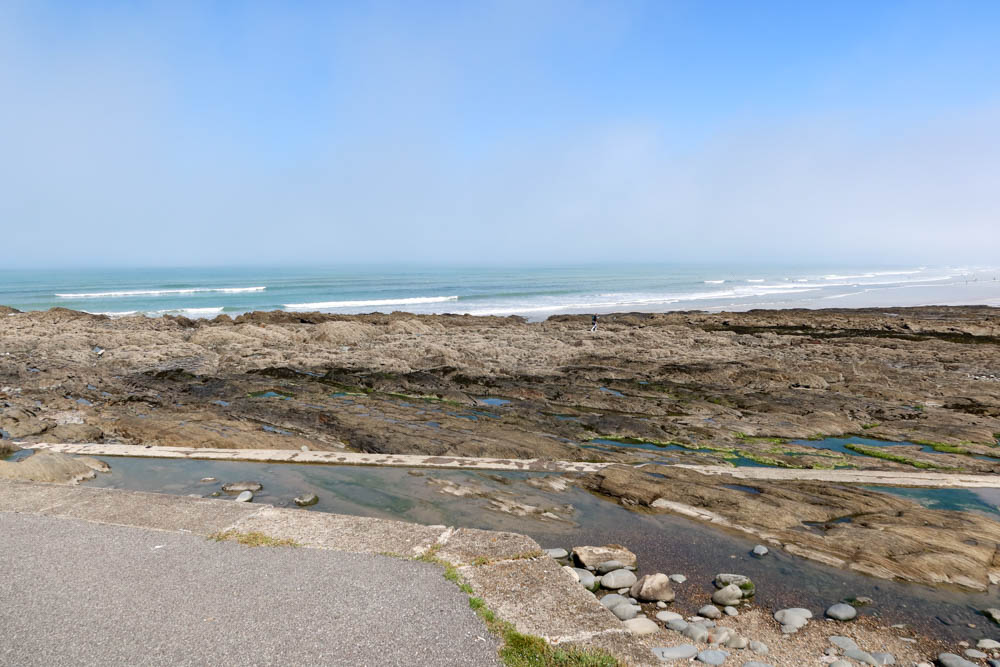
Surf culture in North Devon is live and kicking, with plenty of surf schools, camps, and shops offering surf lessons (group and private lessons are usually available) equipment rentals, and surfboard repairs.
But this isn’t found as much on the southern coast of the county – I live in Exmouth, and here there’s never all that much talk of surfing (but it’s an excellent place for paddleboarding, windsurfing and kayaking!).
So, if you want somewhere that has surfing vibes to match Hawaii, head to the north coast – between Woolacombe and Westward Ho!, where you’ll join a community of surf hunters all searching for the best hollow barrels!
History of Surfing in Devon
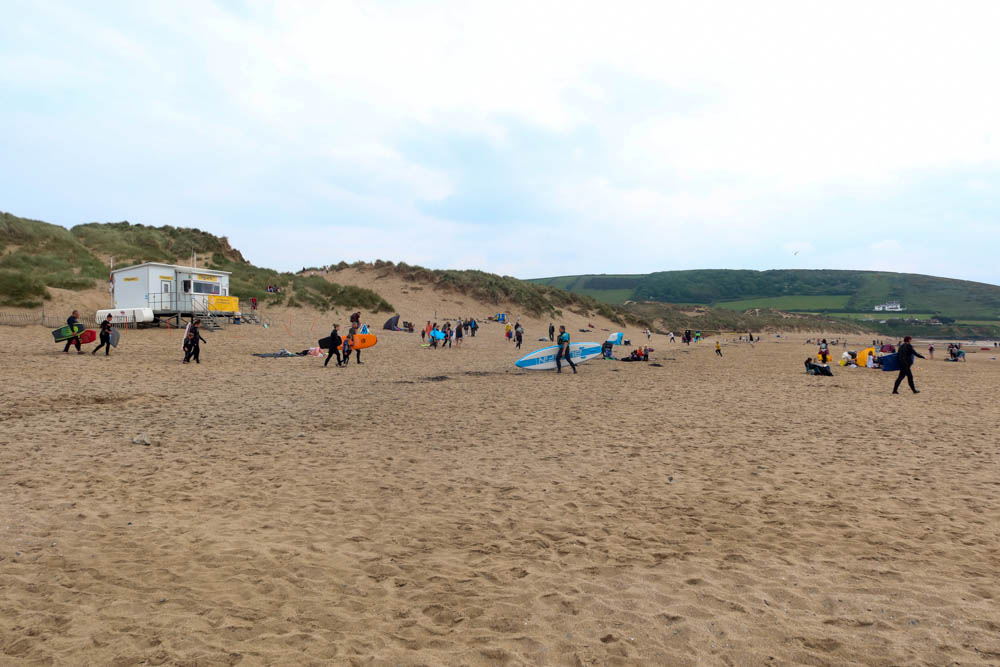
While the first surf in the UK was probably in the 1890s, surfing in Devon has been popular since the 1960s, when the British Surfing Association was formed.
In the early days, surfers had to make their own boards and wetsuits, and the best breaks had not yet been formalised.
However, as the sport grew in popularity, more and more surf spots were discovered along the coast of Devon.
Devon has since become a popular destination for surfers from all over the world.
The county is home to some of the best surf spots in the UK, including Croyde Bay, Woolacombe, Saunton Sands, and Bantham Beach.
These beaches offer a variety of waves, from gentle rollers for beginners to powerful barrels for experienced surfers.
Over the years, Devon has also become home to a number of surf camps and schools, where beginners can learn the basics of surfing and experienced surfers can improve their skills.
These camps offer a range of accommodation options, from basic camping to luxury glamping, and provide all the equipment needed for surfing.
Today, surfing is a major part of Devon’s tourism industry, attracting thousands of visitors each year.
The sport has also had a significant impact on the local economy, with surf shops, cafes, and accommodation providers all benefiting from the influx of surfers.
The Best Surf Spots in Devon
Devon is home to some of the best surf spots in the UK, with a variety of breaks suitable for all levels of surfers.
Here are some of the best surf spots in Devon:
Woolacombe Beach

It’s been rated as the UK’s best beach and is the start of the North Devon surf reserve – Woolacombe is an extremely popular surf spot in North Devon, known for its consistent waves and long sandy beach.
The crashing waves mean that it can be challenging, but there are usually different peaks which are suitable for all levels.
It’s home to a range of surf schools, including Woolacombe Surf Centre, who can provide lessons, board rental and advice.
Woolacombe is one of the most beautiful beach towns in Devon, with a constantly pulsating holiday atmosphere throughout the summer months. Once you’re out of the water, make sure that you check out the best things to do in the town!
Putsborough Beach
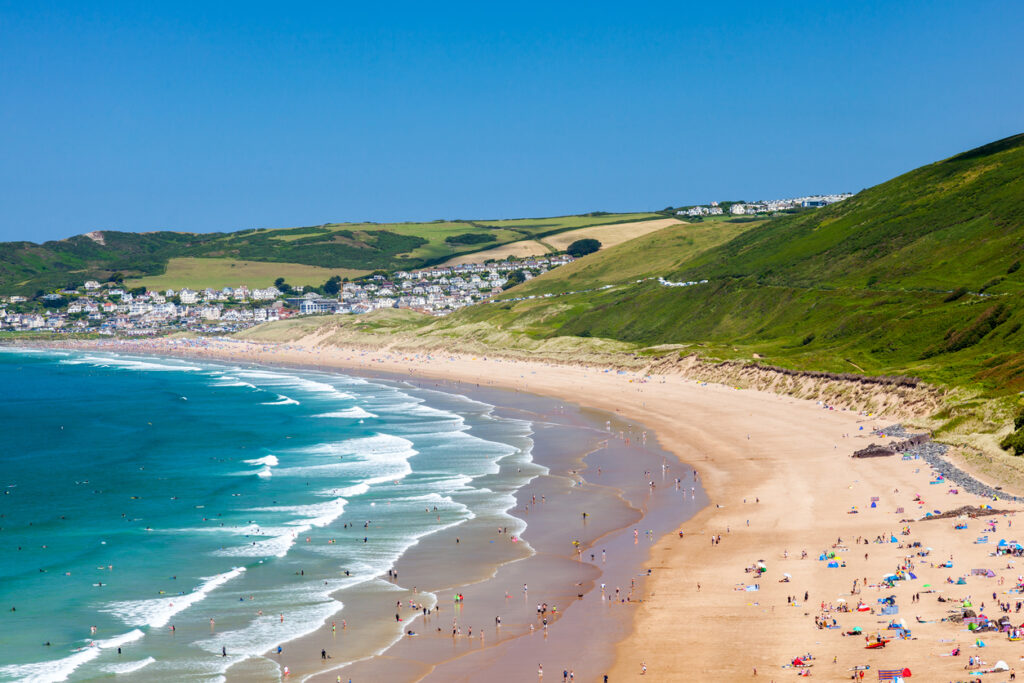
Situated at the far end of Woolacombe Beach – just underneath Baggy Point headland – Putsborough is loved by locals for being less touristy than Woolacombe, but still with reliable waves.
There’s plenty on offer for all levels here, but generally it’s considered the most sheltered and safest beach in the area for beginner surfers.
There are a few surf schools in the area, including Nick Thorn Surf School who provides lessons for beginners, improvers and experienced riders.
Croyde
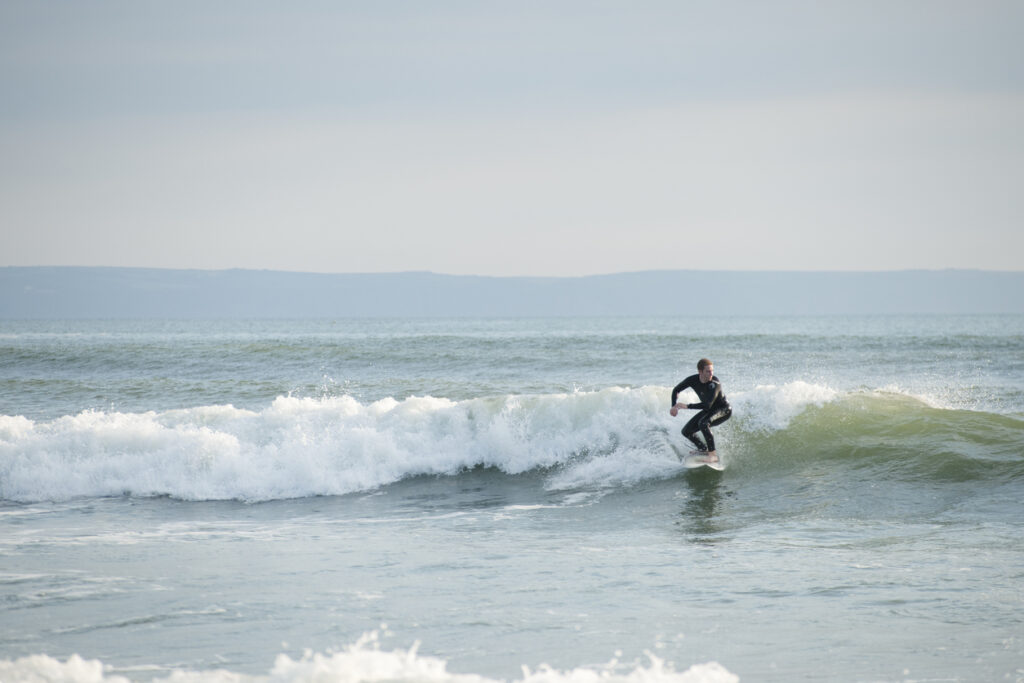
Croyde is one of the most famous surf spots in Devon, and for good reason.
Situated a short journey from Woolacombe, it’s a powerful beach break that can produce some epic waves, particularly during the winter months.
But in the summer, there are also plenty of smaller waves that are suitable for beginners who are just building their surfing skills.
Plus, at this time of year, the small resort town has a buzzing atmosphere that’ll instantly help you relax and unwind.
There are a few surf schools in Croyde, but Surfing Croyde Bay has a 6:1 student to teacher ratio, an indoor changing area and warm showers, making them one of the best-experienced and comfortable places to learn to surf.
Westward Ho!
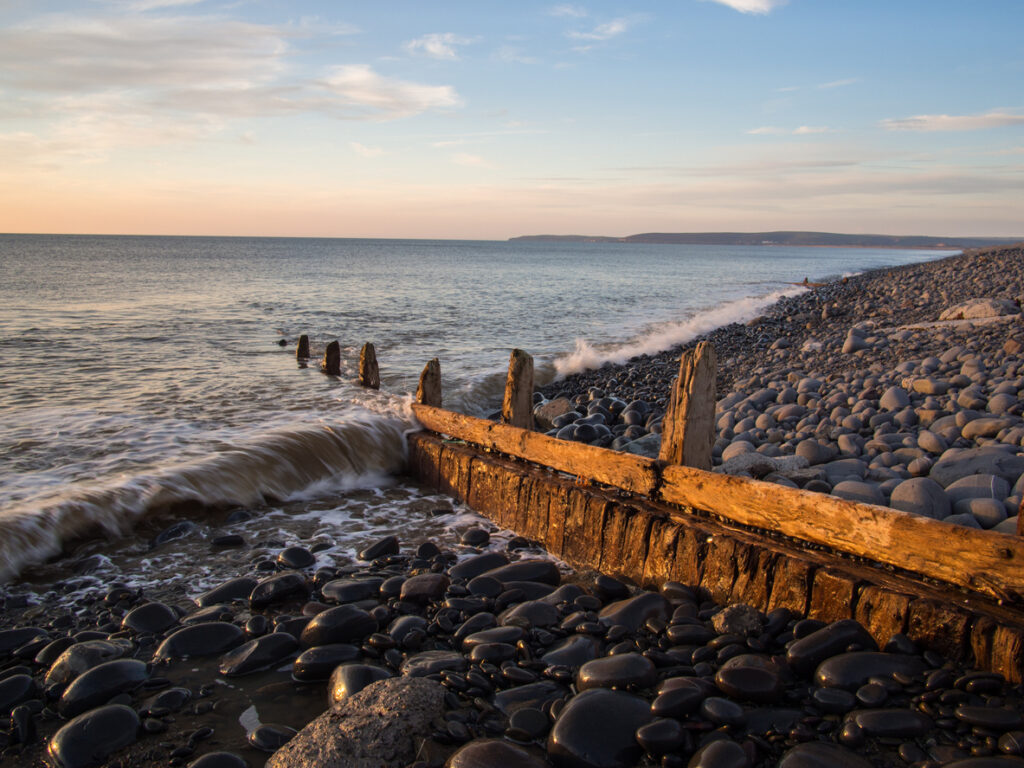
Westward Ho! is another popular surf spot in North Devon, known for its long sandy beach break, eastern winds and swell from South West to North West.
The waves here aren’t quite as dramatic as Woolacombe or Saunton, but the peaks can be ideal for beginners and longboarders.
Plus, North Devon Surf School – the highest-rated surf school, which has been offering sessions since 1988, is located in town – if you want to learn to surf in North Devon, there’s nowhere better.
Saunton Sands
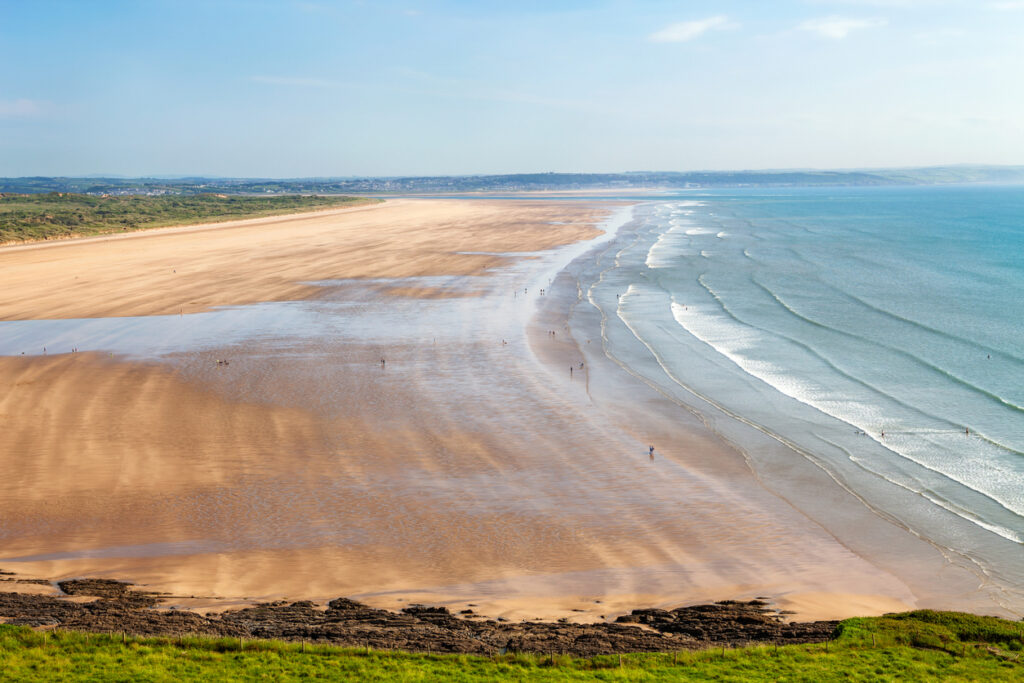
Saunton Sands is a three-mile long, golden sand beach break.
Due to its length, there are plenty of different swells and peaks; typically you’ll find somehting for all abilities when you’re surfing here!
Saunton Beach is a little more isolated than other beaches on this list, but that means that it’s usually a lot quieter (especially in the summer months!) and you’re all the more likely to find your perfect wave!
Surf Saunton offers lessons for beginners, improvers and experts, with all fees including gear rental (including wetsuits).
The Museum of British Surfing is located just inland at nearby Braunton, offering an education into the sport while you’re out of the waves.
Bantham Beach
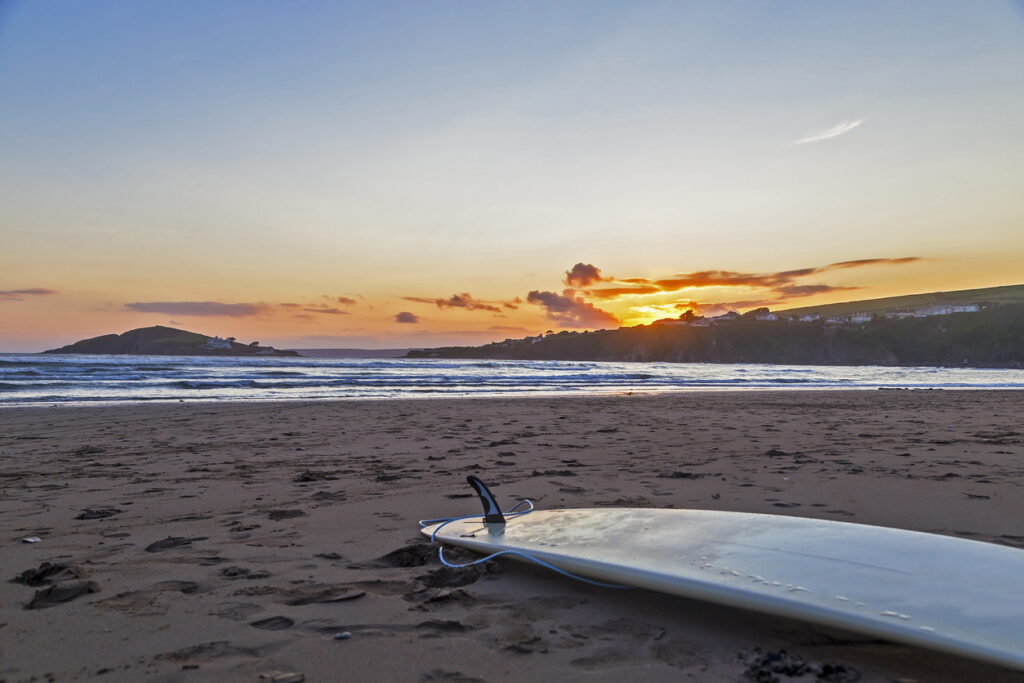
Bantham Beach is one of the most popular South Devon surfing spots, and it’s an ideal beach for beginners to surf.
As mentioned, South Devon isn’t a patch on the dramatic beaches of the north when it comes to surfing, but if you’re looking for mellow waves where you can practice the sport, the west-facing Bantham might be the perfect place!
In fact, the beach is so popular with beginners that it has its own dedicated school – the Bantham Surfing Academy, offering lessons and coaching for all levels.
They also offer paddleboard and kayak sessions and rentals.
The family-friendly beach is ideal for waiting while some members of your group take to the waves; it has a cafe and toilets.
Bantham Beach is conveniently located close to Salcombe and Hope Cove, and is a 50 minute drive to Plymouth (and around an hour from Exeter).
Bigbury-on-Sea
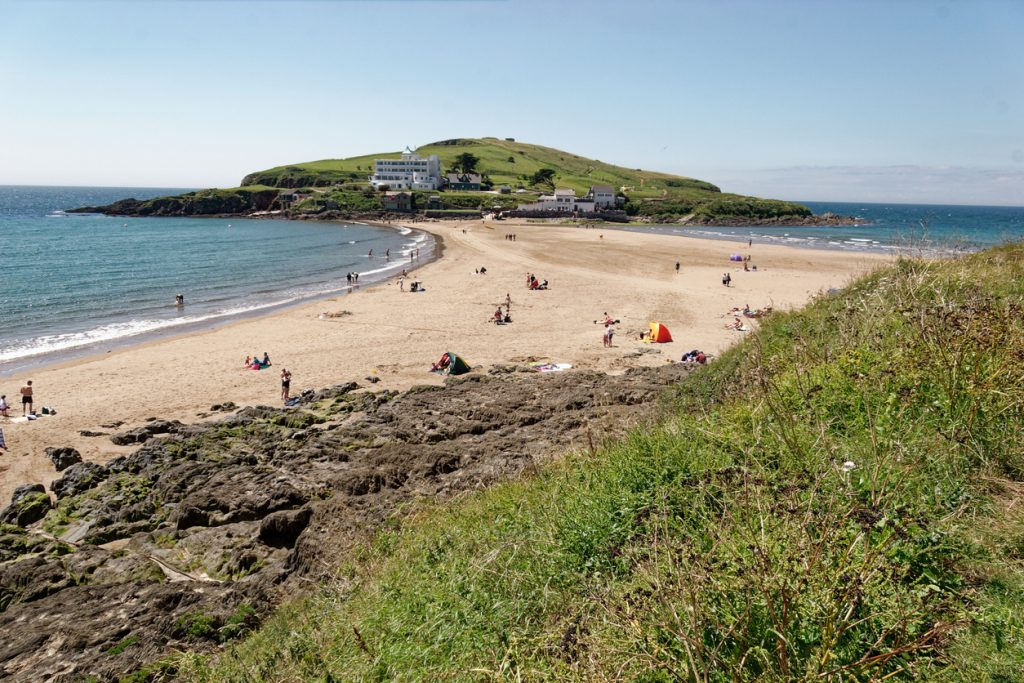
Famous for looking out over the Burgh Island, Bigbury-on-Sea is a popular destination for surfers in Devon.
It’s close to Bantham Beach; located just the other side of the River Avon, the stunning beach curs around the South Hams coastline.
Like Bantham and other South Devon beach towns, Bigbury is ideal for inexperienced surfers, as the waves here are generally kinder than in the north.
Discovery Surf offer a range of sessions, including one-off classes and courses for people aged six and above, with surf gear and wetsuit rental available.
Challaborough
Challaborough Beach is another South Devon surfing hotspot – it’s not as sheltered as Bigbury, which means that the waves can be bigger and more impressive here – it’s one of the most epic rides on the south coast!
As it’s so close to Bigbury-on-Sea, there aren’t any dedicated schools at Challaborough (but if you book a lesson at Bigbury, they may take you here!).
However, seasoned surfers who are keen to experience the waves independently often head here when looking for spots on the South Devon coast!
When to Surf in Devon
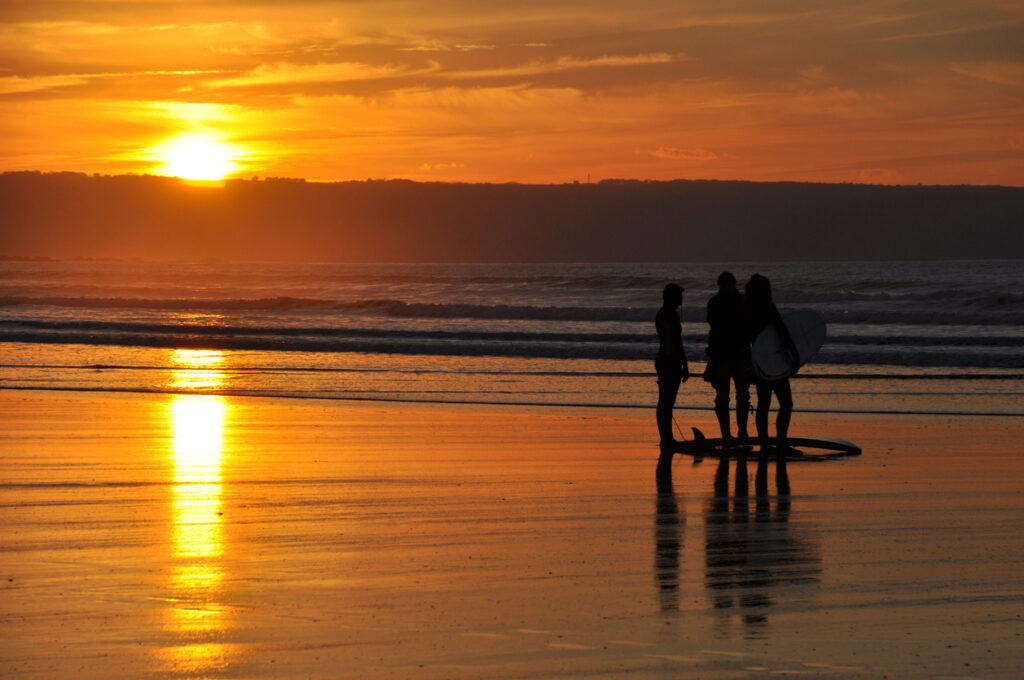
The surf conditions in Devon are influenced by the Atlantic Ocean, which means that the waves can be quite unpredictable.
However, during the autumn and winter months, the swell is usually consistent and the waves can reach up to 12ft.
In the autumn, the waters are still comparatively warm, which makes it an optimum time to surf if you’re confident in your skills and want to seek some perfect barrels while not getting too cold.
Another benefit of surfing in the colder months is that Devon is much quieter; you’ll have the waves to yourself.
However, this doesn’t mean that it’s the only time to go surfing, especially if you’re a beginner! The summer has much more bearable water temperatures and slow waves.
If you’re a beginner or improver, you’ll find the calmer conditions in the summer to be perfect. Plus, the weather and air temperature is generally warmer – but as you’ll be spending 1-2 hours in the water at a time, you’ll still want a wetsuit!
Of course, the busy summer months can mean that the beaches are crowded; but sitting out in warm sunshine after a surfing session is much more appealing than running indoors!
Tides when surfing
The surf in Devon is affected by the tides, and it’s important to know the tide times before heading out.
The best time to surf in Devon is usually around high tide, when the waves are at their most powerful.
However, some surf spots in Devon work better on a low tide, so do your research before heading out – particularly if you’re going independently.
Where to Stay When Surfing in Devon
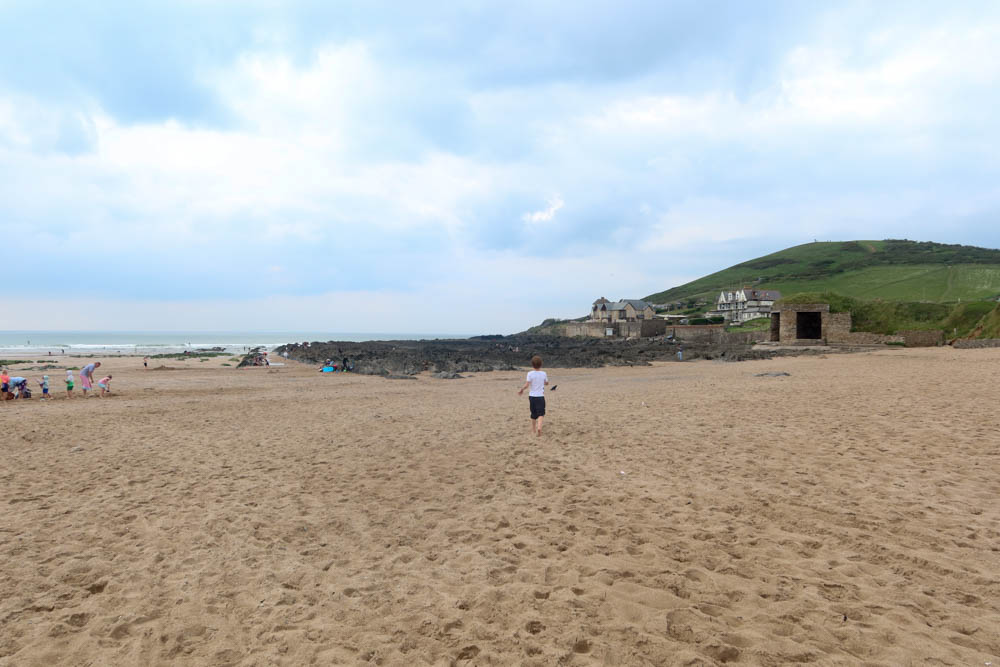
If you’re going to Devon primarily for a surf trip, I’d recommend staying in one of the towns or by one of the beaches that I’ve listed above.
All of these towns are tourist hubs, and most have a range of hotels, B&Bs, self-catering cottages, and campsites.
Some of the most popular areas to stay in Devon for surfing include Croyde, Woolacombe, Saunton, and Bude.
Camping in Devon
If you’re looking for a budget-friendly option, camping is a great choice.
There are many campsites located near the best surf spots in Devon, including the following:
- Skern Lodge in Appledore (near Westward Ho!)
- Twitchen House Holiday Park in Woolacombe
- Surfer’s Paradise Surf Camp in Croyde (as the name suggests, this is wholly focused on surfing!).
Hotels near surf spots in Devon
Of course, there are plenty of hotels close to Devon’s surf spots. Check out the following:
- The Woolacombe Bay Hotel
- Saunton Sands Hotel
- The Beach House in Woolacombe
Is Devon or Cornwall better for surfing?

Are you wondering whether you should visit Devon or Cornwall for a surfing holiday?
Cornwall has some of the most famous surf spots in the UK, such as Fistral Beach, which is known for its consistent waves and hosting international surfing competitions. Watergate Bay (also near Newquay) hosts the UK’s surf festival, Boardmasters every August.
But Devon has a more laid-back vibe and is home to some of the most underrated surf spots in the country.
While Cornwall has a larger number of beach breaks, the North Devon coast is the UK’s first World Surfing Reserve.
This section of coastline is known for its powerful waves and attracts surfers from all over the world, the most famous breaks being on Croyde Beach and around Woolacombe.
So, while Cornwall definitely has more when it comes to surf spots, Devon’s underrated section of north coast definitely competes!
FAQs about surfing in Devon
Do people surf in Devon?
Yes, beginner and advanced surfers alike love the range of surfing beaches and variety of swells in Devon, particuarly on the north coast. There are a few excellent waves suitable for all surfing levels, and the area of coastline around Woolacombe is actually a world-class surfing reserve.
Which beach for surfing in Devon?
Woolacombe is probably the most famous, and you can’t really go wrong here – whatever your level! However, quieter spots include Saunton Beach – where there’s plenty of space and some great schools – and Putsborough, which is close to Woolacombe.
Can you surf at Sandy Bay Devon?
Being located in Lyme Bay near Exmouth, Sandy Bay isn’t great for surfing – the waves are usually flat, especially in the summer! Paddleboarding and kayaking are generally the preferred watersports around this part of Devon.
Is South Devon good for surfing?
Some parts of South Devon are decent for surfing – western facing beaches in the South Hams area, like Bantham, Bigbury on Sea and Challaborough are best. However, if you’re looking for swells for advanced surfers, definitely head to the north.
Is Torquay Devon good for surfing?
Due to Torquay’s position in Torbay, facing the English Channel, it’s not a prime location for surfing. Try paddleboarding or kayaking instead, or head to South Hams or North Devon to take to the waves!
Are you ready for surfing in Devon?
Whether you’re looking for fun waves to practice your skills, huge barrels that’ll leave you thinking you’re in Australia or just some laidback surf sessions, Devon has plenty on offer – it’s easily one of the best places for surfing in the UK.
Beginner and intermediate surfers could find popular surfing spots on either coast, whereas those more advanced at the sport will encounter a wide range of waves all over the north!
Whether you’re after some challenging winter waves or a summer retreat, there’s plenty to dive into in Devon!
